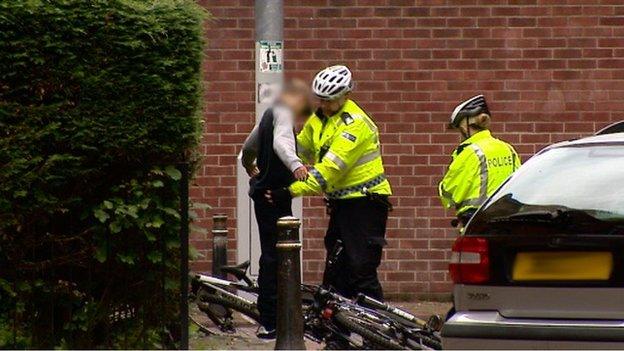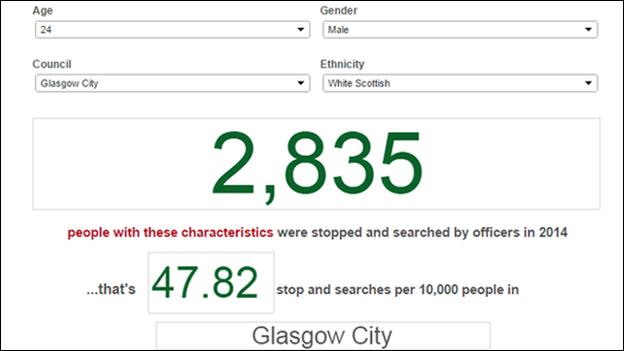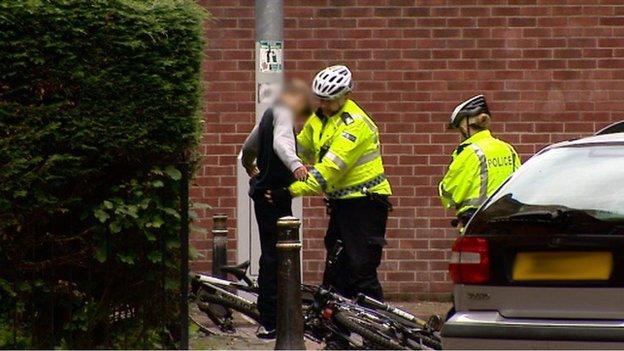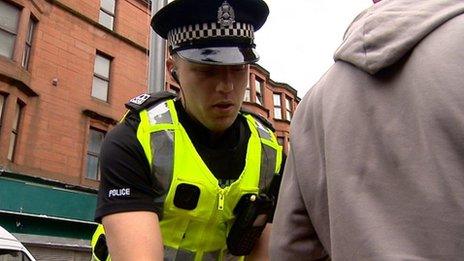Where now for police stop-and-search?
- Published

BBC Scotland revealed figures for stop-and-searches earlier this week
Routinely in politics, caveats can be as important as the core message.
So it was today at Holyrood when the First Minister offered her views on the question of who might be subjected to police stop and search, together with the related issues of when and why.
My esteemed colleagues Lucy Adams and Marc Ellison had disclosed that youngsters under 12 were still facing "consensual" searches, despite promises to put a stop to that.
Consensual? Where there is no statutory, evidential basis for the examination but it proceeds with the obtained agreement of the subject.

Stop-and-search numbers

So, how many people, who are the same age as you, are from the same area as you and have the same ethnic background as you, been searched by the police?
Find out by going to our stop-and-search calculator, external.

At Holyrood today, this disclosure stimulated protests from Conservative leader Ruth Davidson and from her Liberal Democrat counterpart Willie Rennie.
Did Nicola Sturgeon storm and rage, complaining that senior officers had misled parliament? Did she condemn police behaviour? Gentle reader, she did not.
However, she did note that the Scottish Police Authority had asked for a full explanation, to be delivered at their public meeting later this month.
She noted further that the Chief Constable (these days, post reform, there is but one) would be consulting on the appropriate way of ending consensual, non-statutory searches altogether - and not just for those aged under 12. He, apparently, had contacted her to set out his thoughts.
Which brings us to the caveats....
Firstly, Ms Sturgeon said that the process of stopping and searching an individual remained a "vital tool" in the daily endeavour to keep the public safe.
Secondly, she delivered a sustained and vigorous paean of praise for the police. They did a sterling job. A tough job. Every day they put their lives on the line. They deserved our thanks.
So where are we? By senior officer direction, consensual - or what we might call random - searches are due to end, following consultation as to the most effective manner of achieving this. Ms Sturgeon said that would be a speedier method of action than the alternative - which was Holyrood legislation.
But the power to stop and search will remain, where just cause exists. Ms Sturgeon noted, for example, that youngsters might be used by others to conceal weapons or contraband.
For now, an explanation of current practice - as opposed to stated policy - will be given by the Chief Constable to the Scottish Police Authority. It had better, noted Mr Rennie, be a good one.
Earlier, Ms Sturgeon had been subjected to an iterative onslaught from Labour's Kezia Dugdale on the subject of hospital waiting times.
The FM said she was happy to address this topic once again. In truth, she looked about as happy as a GP who is about to hear the tale of Jimmy's bunions for the fifty seventh time.
Ms Dugdale asked for figures on the numbers waiting twelve hours to be seen, then eight hours, then four, by contrast with the situation when the SNP came to power.
Health issues
The statistics, as you will have guessed, do not make uniformly cheerful reading. Ms Dugdale's strategy, though repetitive, was effective. Perhaps one can envisage the same GP asking Jimmy: "Does it hurt here? Here? How about…..?" Eventually, he finds the mark.
But Ms Sturgeon sought to turn things round. Firstly, she described prevailing circumstances. More old folk, more patients turning up at A&E, more serious ailments, more admissions required.
Secondly, she set out an alternative contrast. Her government's record, she said, was better than Labour's when in past power in Scotland - or present power in Wales.
Ms Dugdale preferred to suggest that the SNP's record was worse than that of David Cameron. In response, Ms Sturgeon borrowed a phrase from a previous Scottish Labour leader.
If, she said, Labour wanted to trade stats on health care at the forthcoming UK General Election, then they should "Bring It On!". (Capitals somehow seem obligatory.) Ms Dugdale, all passion but, more importantly, all questions spent, simply nodded in assent.
- Published5 February 2015

- Published4 February 2015

- Published26 November 2014
